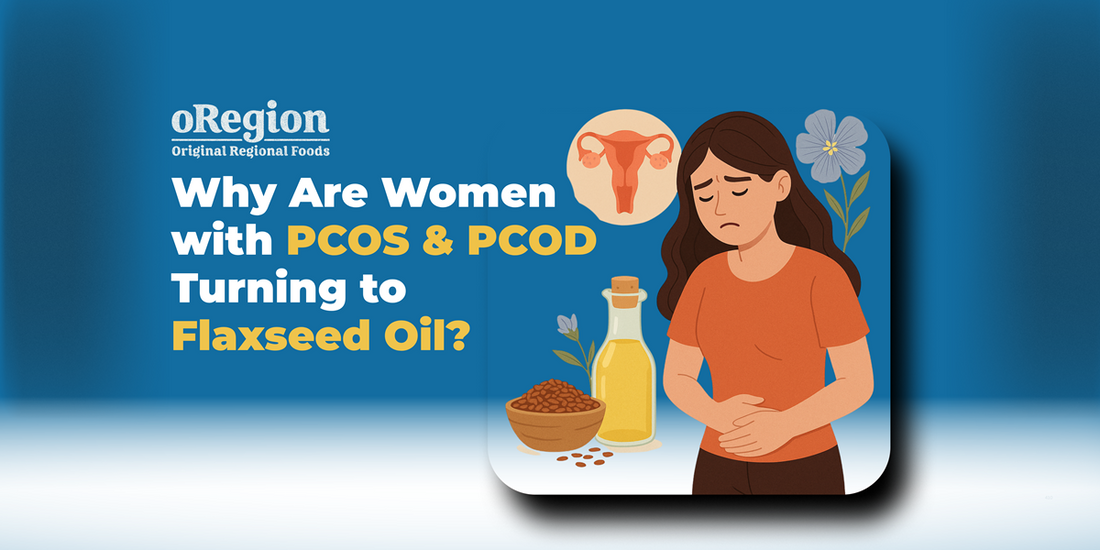
Why Are Women with PCOS & PCOD Turning to Flaxseed Oil
By oregion foodsUnderstanding PCOS and PCOD: The Basics Every Woman Should Know
What Is PCOS (Polycystic Ovary Syndrome)?
Polycystic Ovary Syndrome (PCOS) is a hormonal disorder commonly seen in women of reproductive age. It is characterized by irregular periods, elevated androgen levels, and polycystic ovaries visible on ultrasound. Women with PCOS often struggle with weight gain, acne, and difficulty conceiving.
What Is PCOD (Polycystic Ovarian Disease)?
PCOD refers to a condition where the ovaries release many immature or partially mature eggs, which eventually turn into cysts. This disrupts ovulation, resulting in hormonal imbalance, irregular menstrual cycles, and infertility.
Key Differences Between PCOS and PCOD
-
PCOD is more common and less severe than PCOS.
-
PCOS is an endocrine disorder; PCOD is primarily an ovarian condition.
-
Women with PCOS may experience metabolic disturbances and insulin resistance, while PCOD symptoms are usually more manageable.
Common Symptoms and Health Risks Associated with PCOS/PCOD
-
Irregular or absent periods
-
Excess facial/body hair
-
Acne and oily skin
-
Infertility or subfertility
-
Weight gain or obesity
-
Risk of Type 2 Diabetes, hypertension, and heart disease
The Role of Diet and Natural Supplements in PCOS/PCOD Management
Why Lifestyle and Nutrition Matter
An anti-inflammatory diet and regular exercise are essential to manage symptoms. Nutritional choices directly affect insulin sensitivity, hormonal balance, and inflammation.
The Growing Demand for Plant-Based Solutions
With side effects linked to conventional hormone therapies, many women are turning to plant-based functional foods like Cold Pressed Flaxseed Oil for relief.
How Functional Foods Like Flaxseed Oil Fit In
Cold-pressed flaxseed oil is rich in Alpha-Linolenic Acid (ALA), a powerful omega-3 fatty acid known to support hormonal health, reduce inflammation, and improve insulin sensitivity.
Read More : Flaxseed Oil for Hormonal Balance in Women
What Is Flaxseed Oil and Why Is It Gaining Attention?
Nutritional Composition of Flaxseed Oil
-
Omega-3 fatty acids (ALA)
-
Lignans (plant polyphenols)
-
Vitamin E
-
Essential fatty acids that promote cellular health
-
This makes flaxseed oil one of the most nutrient-dense oils available.
What Makes Flaxseed Oil Different from Other Plant Oils?
Unlike regular cooking oils, flaxseed oil:
-
Contains 3 times more omega-3s than chia or walnut oil
-
Has anti-inflammatory lignans that other oils lack
-
Is 100% vegan and heart-healthy
Cold-Pressed vs. Regular Flaxseed Oil – Which Is Better?
Cold-pressed flaxseed oil retains maximum nutrients because it is extracted without heat. Regular or refined oil loses most of its omega-3 content during processing. Always opt for organic cold-pressed flaxseed oil for best results.
How Flaxseed Oil Supports Women with PCOS & PCOD
Hormonal Balance Through Natural Omega-3s
Improving FSH Levels and LH/FSH Ratio
Studies have shown that flaxseed oil can increase FSH (Follicle-Stimulating Hormone) and restore a healthier LH/FSH ratio, helping regulate the menstrual cycle.
Impact on Estrogen, Progesterone, and Testosterone Levels
Flaxseed oil can modulate estrogen metabolism, support progesterone production, and lower testosterone – helping reduce symptoms like acne, hair growth, and infertility.
Insulin Sensitivity and Blood Sugar Regulation
Can Flaxseed Oil Reduce Insulin Resistance?
Yes. ALA in flaxseed oil helps regulate insulin levels and improves glucose metabolism, reducing risks of Type 2 Diabetes – a major concern for women with PCOS.
Lowering Inflammation and Oxidative Stress
ALA’s Anti-Inflammatory Role in Hormonal Health
The omega-3s in flaxseed oil neutralize pro-inflammatory markers, decreasing oxidative stress, which plays a big role in PCOS-related infertility and weight gain.
Supporting Reproductive Function Naturally
Menstrual Regularity and Ovulation Support
By rebalancing hormones, flaxseed oil promotes regular periods and improves the chances of ovulation, enhancing fertility outcomes naturally.
Scientific Evidence: What Do Clinical Studies Say?
Human Trials and Hormonal Outcomes
Human studies have shown that regular consumption of flaxseed oil improves menstrual regularity, lowers testosterone, and enhances FSH production in PCOS patients.
Insights from Animal Research on Flaxseed and PCOS
Animal research demonstrates that flaxseed oil helps shrink ovarian cysts, reduces inflammation, and enhances fertility markers.
Limitations and What Needs More Study
While early results are promising, more large-scale, long-term clinical trials are needed to solidify flaxseed oil as a mainstream PCOS therapy.
Benefits Beyond PCOS: Additional Reasons Women Use Flaxseed Oil
Heart Health and Cholesterol Regulation
Flaxseed oil helps lower LDL (bad cholesterol) and increase HDL, supporting cardiovascular health in women prone to heart risks from hormonal imbalances.
Skin and Hair Benefits from Omega-3 Fatty Acids
Regular intake leads to glowing skin, reduced acne, and stronger, shinier hair—benefits that every PCOS warrior loves.
Mental Wellness and Mood Stabilization
Omega-3s improve mood, reduce anxiety, and support brain function, which is essential for women dealing with PCOS-related stress and depression.
How to Use Flaxseed Oil Safely for PCOS/PCOD Management
Recommended Dosage for Women with PCOS
Start with 1 to 2 tablespoons daily. You can add it to smoothies, salads, or take directly on an empty stomach.
Tips for Choosing High-Quality Flaxseed Oil
Organic, Cold-Pressed, and Unrefined Options
Choose oRegion’s cold-pressed flaxseed oil, which is:
-
100% vegan
-
Chemical-free
-
Cold-pressed to preserve nutrients
-
Rich in omega-3 ALA
Best Time to Consume Flaxseed Oil
-
Morning: For hormonal balance and metabolism support
-
Evening: To ease inflammation and improve sleep
Can It Be Combined with Other Supplements or Medications?
Yes, but always consult your healthcare provider—especially if you're on hormonal pills, metformin, or thyroid medications.
Success Stories from PCOS Warriors
Challenges and Things to Watch Out For
Many women report significant improvements in menstrual regularity, skin clarity, and fertility after consistently using flaxseed oil. However, it’s not an overnight solution. Consistency is key.
Consulting a Healthcare Provider Before Starting
Every body is different. Consult your doctor before adding flaxseed oil to your PCOS/PCOD treatment plan.
Potential Side Effects and Precautions
Who Should Avoid Flaxseed Oil?
-
Pregnant women (unless advised by a doctor)
-
Those with bleeding disorders
-
People scheduled for surgery
Possible Allergic Reactions or Digestive Issues
Some may experience:
-
Mild bloating or gas
-
Allergic rashes
-
Start with small doses and increase gradually.
Interaction with Hormonal Medications
Avoid taking flaxseed oil simultaneously with birth control pills or hormone therapy without professional guidance.
Final Thoughts: Is Flaxseed Oil Right for Your PCOS/PCOD Journey?
A Natural Step Toward Hormonal Wellness
If you’re looking for a plant-based, nutrient-rich solution to support your hormonal health, cold-pressed flaxseed oil is a powerful ally.
Individualized Approach Matters
PCOS/PCOD is not a one-size-fits-all condition. Tailor your nutrition and supplement routine to your unique health profile.
Importance of Medical Guidance in Natural Treatment Plans
While flaxseed oil can be transformational, it should be used as part of a comprehensive plan that includes medical consultation, regular monitoring, and healthy lifestyle changes.
Follow us for more wellness tips
-
📸 Instagram: @oRegion.in
-
📘 Facebook: facebook.com/oRegion.in
-
▶ YouTube: https://www.youtube.com/@oRegion_foods












